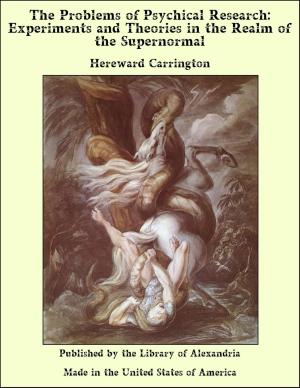Taoist Texts: Ethical, Political, and Speculative
Nonfiction, Religion & Spirituality, New Age, History, Fiction & Literature| Author: | Frederic Henry Balfour | ISBN: | 9781465576705 |
| Publisher: | Library of Alexandria | Publication: | March 8, 2015 |
| Imprint: | Language: | English |
| Author: | Frederic Henry Balfour |
| ISBN: | 9781465576705 |
| Publisher: | Library of Alexandria |
| Publication: | March 8, 2015 |
| Imprint: | |
| Language: | English |
IT occasionally happens that a sudden ray of clear and valuable light is thrown upon a long-disputed subject from a source the very existence of which was unsuspected, and the authority of which would certainly never have been allowed. Just as an accident may reveal what generations of scientific men have laboured in vain to discover: just as a rank outsider may win a race, or the dart, shot at a venture, bit the bull's-eye when trained archers have discharged a quiversfull of arrows without success,—so may some happy and spontaneous phrase, falling from one who approaches a topic of interest or difficulty for the first time, fresh and unencumbered by preconceptions or the dissertations of experts, embody in itself the kernel of the enigma, and make the whole thing promptly and for ever plain. And such a service has, I think, been recently rendered to the cause of philosophical research in China. A late able American writer, whose work on "Oriental Religions" is, or ought to be, on the shelf of every reading man, has given to the Confucian school, for the first time, its true designation of Rationalist. Confucius was a Rationalist in every sense; his folsowers are Rationalists; his philosophy was altogether Rationalistic in its scope. The word is just the one we wanted, but which we never found; and its universal acceptation, from henceforth, can be only a matter of time. It is not only for supplying us with a just descriptive epithet for the orthodox philosophy of China, however, that we are indebted to Mr. Johnson. As soon as ever the term Rationalism is recognised as belonging to the system of Confucius, it will fall into deserved desuetude in that sphere where hitherto it has usurped another's right. No word could, in my opinion, be more inappropriate, or more unhappily selected, as applied to the philosophy of Lao Tsze. That the character TAO ### may be properly translated "reason" in certain instances, I do not deny. That it approaches the idea of λογος in the Johannine sense of the word appears generally allowed. For the rendering of it by "way" there are both etymological and philosophical recommendations which may not be overlooked. But that none of these is the true and actual meaning of the word in its esoteric sense I hope to show in a few words, submitting, at the outset, that no fitter illustration could be offered of the fatality attending servile adherence to a literal system of translation than the rendering, hitherto in force, of Reason. The letter killeth; and in the present instance it has killed all sense and meaning out of the word it was attempting to explain.
IT occasionally happens that a sudden ray of clear and valuable light is thrown upon a long-disputed subject from a source the very existence of which was unsuspected, and the authority of which would certainly never have been allowed. Just as an accident may reveal what generations of scientific men have laboured in vain to discover: just as a rank outsider may win a race, or the dart, shot at a venture, bit the bull's-eye when trained archers have discharged a quiversfull of arrows without success,—so may some happy and spontaneous phrase, falling from one who approaches a topic of interest or difficulty for the first time, fresh and unencumbered by preconceptions or the dissertations of experts, embody in itself the kernel of the enigma, and make the whole thing promptly and for ever plain. And such a service has, I think, been recently rendered to the cause of philosophical research in China. A late able American writer, whose work on "Oriental Religions" is, or ought to be, on the shelf of every reading man, has given to the Confucian school, for the first time, its true designation of Rationalist. Confucius was a Rationalist in every sense; his folsowers are Rationalists; his philosophy was altogether Rationalistic in its scope. The word is just the one we wanted, but which we never found; and its universal acceptation, from henceforth, can be only a matter of time. It is not only for supplying us with a just descriptive epithet for the orthodox philosophy of China, however, that we are indebted to Mr. Johnson. As soon as ever the term Rationalism is recognised as belonging to the system of Confucius, it will fall into deserved desuetude in that sphere where hitherto it has usurped another's right. No word could, in my opinion, be more inappropriate, or more unhappily selected, as applied to the philosophy of Lao Tsze. That the character TAO ### may be properly translated "reason" in certain instances, I do not deny. That it approaches the idea of λογος in the Johannine sense of the word appears generally allowed. For the rendering of it by "way" there are both etymological and philosophical recommendations which may not be overlooked. But that none of these is the true and actual meaning of the word in its esoteric sense I hope to show in a few words, submitting, at the outset, that no fitter illustration could be offered of the fatality attending servile adherence to a literal system of translation than the rendering, hitherto in force, of Reason. The letter killeth; and in the present instance it has killed all sense and meaning out of the word it was attempting to explain.















